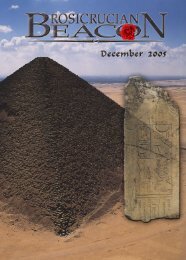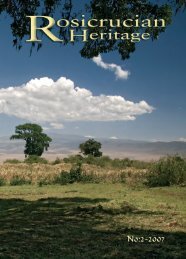Rosicrucian Beacon Magazine - 2013-06 - AMORC
Rosicrucian Beacon Magazine - 2013-06 - AMORC
Rosicrucian Beacon Magazine - 2013-06 - AMORC
Create successful ePaper yourself
Turn your PDF publications into a flip-book with our unique Google optimized e-Paper software.
The ruins of the Great Temple of Aten.The heat of Aten gave Akhenaten life, andmaintained it in him. And while life was in him,Aten was in him. The life of Aten was his life andhis life was Aten’s life. Akhnaton therefore was theAten, the living incarnation of the Aten, not a meregod or one of the gods of the Egyptian pantheon.It was therefore not necessary to go to the templeof Amun to receive spiritual nourishment, wisdomor understanding.He placed great stress on life and loving relationshipswithin his family and among the people. Byelevating the status of Nefertiti to that of co-ruler,he recognised the feminine side of his godly status.For him, a balanced relationship was the way ofMa’at! Egyptologists acknowledge Nefertiti’s statusas co-ruler, and more depictions of Nefertiti have infact been found than those of Akhenaten.His new religion was democratic and universal,good for human relations within and outside hisKingdom. The Aten was for all the peoples. Farfrom being ugly, the new Amarna art-form broughtthe most beautiful and realistic depictions of thenatural world ever seen in Egypt, and breaking withtradition, showed scenes of familial affection andfreedom within the royal family for the first time.On the problem of evil and the reconciliation ofopposites, it can be argued that he was trying tomake people focus not on the dualities of creationbut on apprehending the reality of the One, namelyheaven and earth as one reality. On the criticism ofhis ‘hubris’, one can argue that he was presentingthe idea or fact of a mystic’s experience; he sawhimself as one with God, and there was no need formediation through a priesthood, for his experiencewas direct.Final AnalysisAkhenaten has been judged by posterity as both pharaohand religious reformer. This is perhaps the tragedy: thedichotomy between his duty as pharaoh to ensure thewell-being of his country and people, and his desire topursue his personal religious beliefs.Viewed as a pharaoh, he was indeed a failure! Hehad inherited an Empire at peace with its neighbours,wealthier than ever before, and supremely confident.But by the end of this 17-year reign, the Empire was insevere decline, its vassal states had been conquered byintruders, or were in open revolt, and Egypt itself wasteetering on the brink of social and economic collapse,its people confused and the country in turmoil. Thisexplains much of the criticism directed by Egyptologists14The <strong>Rosicrucian</strong> <strong>Beacon</strong> -- June <strong>2013</strong>© Supreme Grand Lodge of <strong>AMORC</strong>











